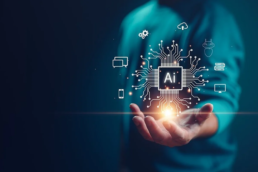Generative AI is a type of artificial intelligence that can create new content, such as images, videos, text, and music. It does this by learning from existing data and then generating new content that is similar to the data it was trained on.
Generative AI has the potential to revolutionize many industries, including healthcare. Here are a few examples of how generative AI is being used in healthcare today:
-
Drug discovery: Generative AI can be used to generate new drug candidates and to predict the properties of drugs. This can help to accelerate the drug discovery process and to develop more effective and safer drugs. For example, generative AI was used to develop a drug candidate for COVID-19 that is currently in clinical trials.
-
Medical imaging: Generative AI can be used to improve the quality of medical images and to generate new types of medical images. This can help doctors to diagnose diseases more accurately and to plan treatments more effectively. For example, generative AI can be used to create synthetic medical images that can be used to train doctors on new procedures or to test new medical devices.
-
Personalized medicine: Generative AI can be used to develop personalized treatment plans for patients. This can help to improve the outcomes of patients and to reduce the cost of healthcare. For example, generative AI can be used to predict how a patient will respond to a particular treatment or to identify the best treatment for a patient’s individual needs.
Here are a few examples of how generative AI is likely to be used in healthcare in the future:
-
Virtual assistants: Generative AI-powered virtual assistants can help patients to manage their health and well-being. For example, a virtual assistant could help a patient to track their symptoms, to schedule appointments, and to order medications. A virtual assistant could also provide patients with personalized health advice and support.
-
Remote monitoring: Generative AI can be used to develop remote monitoring systems that can track patients’ health in real time. This can help to identify potential health problems early and to prevent serious complications. For example, a remote monitoring system could track a patient’s blood sugar levels and alert the patient or their doctor if their blood sugar levels get too high or too low.
-
Precision medicine: Generative AI can be used to develop personalized treatments for patients based on their genetic makeup and other factors. This can help to improve the outcomes of patients and to reduce the side effects of treatments. For example, generative AI is being used to develop personalized cancer treatments that are targeted to the specific mutations in a patient’s tumor.
Generative AI has the potential to transform healthcare and to make it more accessible, affordable, and effective for everyone. However, it is important to use generative AI responsibly and ethically. We need to ensure that generative AI is used to create positive and beneficial outcomes for patients and for society as a whole.
Here are some of the potential risks of using generative AI in healthcare:
- Bias: Generative AI models are trained on data, and if that data is biased, the generative AI model will be biased as well. This could lead to generative AI models that generate biased results, which could harm patients.
- Misinformation: Generative AI models can be used to generate fake medical information, which could be harmful to patients. For example, a generative AI model could be used to generate fake medical images or to generate fake medical research results.
- Privacy: Generative AI models could be used to violate the privacy of patients. For example, a generative AI model could be used to generate synthetic medical images that are based on real patient data.
It is important to develop safeguards to mitigate the risks of using generative AI in healthcare. For example, we need to develop methods to detect and remove bias from generative AI models. We also need to develop methods to combat the spread of misinformation generated by generative AI models. And we need to develop policies and procedures to protect the privacy of patients when using generative AI models.
Generative AI has the potential to revolutionize healthcare and to make it more accessible, affordable, and effective for everyone. However, it is important to use generative AI responsibly and ethically. By developing safeguards to mitigate the risks of using generative AI, we can ensure that generative AI is used to create positive and beneficial outcomes for patients and for society as a whole.




